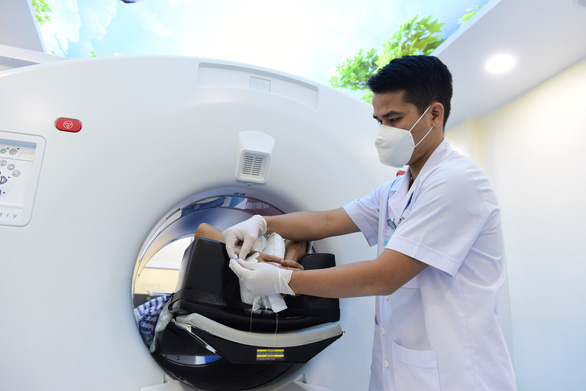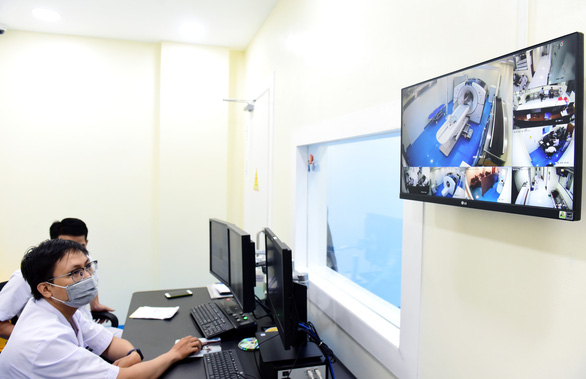Cancer patients across Vietnam are often forced to wait months for scans and treatment as large hospitals in Ho Chi Minh City and Hanoi struggle with medicine shortages and inoperable equipment.
When Nguyen Thi H., a resident of Ha Dong District, Hanoi visited the Hanoi Oncology Hospital in early October, doctors recommended she undergo a PET/CT scan in order to identify and diagnose metastatic cancers in her body.
Unfortunately, doctors at the hospital also told H. that she would have to wait until early November for the scan due to a backlog of patients.
According to Le Van Quang, director of K Hospital in Hanoi, a two-week wait time is not uncommon for a PET scan in Hanoi.
Lack of radiopharmaceuticals
A PET/CT scanning system at the Ho Chi Minh City Oncology Hospital was recently put back into operation after over a year of being left idle due to a shortage of 18F-FDG – the radiopharmaceutical used during PET scans.
The PET/CT system, however, is still only being operated in moderation as the hospital continues its struggle with the 18F-FDG supply issues.
The result of having the PET/CT system not operating at full capacity is a one month wait time for patients who need a scan.
According to one hospital employee, the hospital can conduct seven PET/CT scans a day, but the number of patients in need is much higher than that.
"The shortage of radiopharmaceuticals also doesn’t help."
Similarly, at Cho Ray Hospital and Military Hospital 175 in Ho Chi Minh City, patients in need of PET/CT scans are being asked to wait over a week.
Diep Bao Tuan, deputy director of the Ho Chi Minh City Oncology Hospital, told Tuoi Tre (Youth) newspaper that, this past June, the hospital received radiopharmaceuticals from Cho Ray Hospital so that it could conduct PET/CT scans for cancer patients three days a week.
 |
| A patient undergoes a PET/CT scan at the Ho Chi Minh City Oncology Hospital. Photo: Duyen Phan / Tuoi Tre |
With a maximum capacity of seven scans per day, Ho Chi Minh City Oncology Hospital is capable of conducting a mere 21 scans per week.
Without the shortage of 18F-FDG, the hospital can provide 30 PET/CT scans per day, or more than 200 per week.
“We have asked for the municipal Department of Health’s permission to build a radioactive isotope production facility at our second campus in Thu Duc City because we simply don’t have enough radiopharmaceuticals for PET/CT scans.
“Our second campus currently has two PET/CT scanning systems which can process a combined 400 patients per week,” Tuan added.
Idle equipment
Hanoi is estimated to have five PET scanners, but only three are operating normally.
One of the machines currently that was out of commission is at Bach Mai Hospital, where legal issues over the past two years and an expired contract between the hospital and the equipment installation company led to a major patient backlog.
“The scanner was put back into use earlier this year, and can be used for several more years, but there is a lot of other equipment at the hospital’s Nuclear Medicine and Oncology Center that just sits idle.
“The patients who need this equipment are transferred to other hospitals,” a representative of Bach Mai Hospital said.
Patients in Ho Chi Minh City face similar wait times for PET/CT scans, and many have even tried flying to different cities in search of shorter wait times.
The issue extends beyond PET/CT scans. At K Hospital, for example, there are nine radiotherapy systems but four are currently broken.
The other five are used around the clock, meaning there is little time for maintenance.
The hospital needs ten more radiotherapy systems, as well as MRI and CT scanning systems, in order to keep up with the needs of its patients.
Hindering the treatment process
According to Tuan, an employee at the Ho Chi Minh City Oncology Hospital, approximately 82 percent of the hospital’s patients come from other provinces.
Between the hospital’s two campuses, there are just 13 radiotherapy machines, meaning patients must wait as long as eight weeks to receive treatment.
“Although the second campus has six radiotherapy machines, we are still behind. The hospital has asked for two more machines in order to reduce wait times.
“The hospital is also facing the shortage of CT scanners and endoscopic surgery facilities, and many of our other facilities are quite old.
“We also dream of, one day, having surgical robots to improve the effectiveness of our treatments,” Tuan added.
Like us on Facebook or follow us on Twitter to get the latest news about Vietnam!





















































